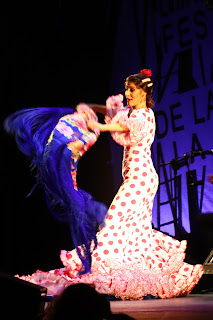Tópicos

The dancer's dark eyes flashed. Arching her back she twisted her lithe body so that her brightly coloured dress, tight at the hips but loose below her knees, swirled around her mimicking the movement of her bright blue wrap. She stamped her feet, she clapped her hands and her olive coloured skin shone with a fine patina of sweat. Spanish cliché time. As real and yet as unreal as Morris Dancers outside the pub on the Village Green. I've just finished a book by a Spanish author. The basic premise is that her main character moves to London looking for work and ends up working in a bookshop where her life takes a turn for the better. It was an enjoyable, if slight, read, a bit like one of those US Christmas films where the hero rediscovers the joy and warmth of small town life. What struck me most about the book was that it was loaded with Spanish clichés about England and that it repeatedly and wantonly ascribed Spanish habits to Britons. One of the principle things, that turned u...
